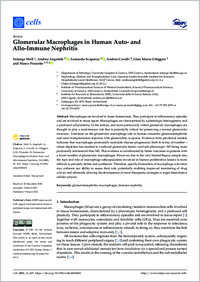Glomerular macrophages in human auto- and allo-immune nephritis
- Angeletti, Andrea Nephrology, Dialysis and Transplantation Unit, Giannina Gaslini Scientific Institute for Research, Hospitalization and Healthcare, Genoa, Italy
- Scapozza, Leonardo Institute of Pharmaceutical Sciences of Western Switzerland, School of Pharmaceutical Sciences, University of Geneva, Switzerland
- Cavalli, Andrea Institute for Research in Biomedicine (IRB), Faculty of Biomedical Sciences, Università della Svizzera italiana, Switzerland
- Ghiggeri, Gian Marco Nephrology, Dialysis and Transplantation Unit, Giannina Gaslini Scientific Institute for Research, Hospitalization and Healthcare, Genoa, Italy
- Prunotto, Marco Nephrology, Dialysis and Transplantation Unit, Giannina Gaslini Scientific Institute for Research, Hospitalization and Healthcare, Genoa, Italy - Galapagos NV, Basel, Switzerland
- Moll, Solange Department of Pathology, University Hospital of Geneva, Switzerland
-
13.09.2021
Published in:
- Cells. - 2021, vol. 10, no. 3, p. 19 p
English
Macrophages are involved in tissue homeostasis. They participate in inflammatory episodes and are involved in tissue repair. Macrophages are characterized by a phenotypic heterogeneity and a profound cell plasticity. In the kidney, and more particularly within glomeruli, macrophages are thought to play a maintenance role that is potentially critical for preserving a normal glomerular structure. Literature on the glomerular macrophage role in human crescentic glomerulonephritis and renal transplantation rejection with glomerulitis, is sparse. Evidence from preclinical models indicates that macrophages profoundly modulate disease progression, both in terms of number—where depletion has resulted in a reduced glomerular lesion—and sub-phenotype—M1 being more profoundly detrimental than M2. This evidence is corroborated by better outcomes in patients with a lower number of glomerular macrophages. However, due to the very limited biopsy sample size, the type and role of macrophage subpopulations involved in human proliferative lesions is more difficult to precisely define and synthesize. Therefore, specific biomarkers of macrophage activation may enhance our ability to assess their role, potentially enabling improved monitoring of drug activity and ultimately allowing the development of novel therapeutic strategies to target these elusive cellular players.
- Language
-
- English
- Classification
- Medicine
- License
- Open access status
- gold
- Identifiers
-
- RERO DOC 333384
- DOI 10.3390/cells10030603
- ARK ark:/12658/srd1319255
- Persistent URL
- https://n2t.net/ark:/12658/srd1319255
Statistics
Document views: 204
File downloads:
- Fulltext: 396
